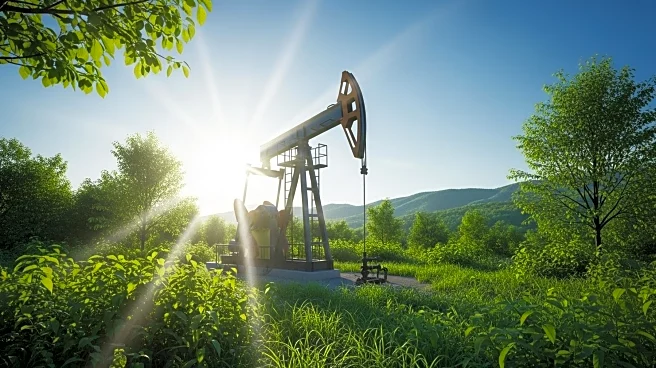What is the story about?
What's Happening?
The Permian Basin has seen a significant reduction in greenhouse gas emissions, dropping nearly 20% since 2022, according to a new analysis by S&P Global Commodity Insights. This reduction occurred even as oil and gas production increased, highlighting advancements in methane detection and mitigation technologies. Between 2022 and 2024, emissions fell by 25 million metric tons of carbon dioxide equivalent, while production grew by the equivalent of 500,000 barrels per day. Improved methane management, including advanced monitoring systems, upgraded equipment, and the integration of artificial intelligence into field operations, contributed to this reduction. S&P estimates that methane intensity fell by more than 50% during this period.
Why It's Important?
The reduction in emissions from the Permian Basin is significant for the oil and gas industry, demonstrating that increased production can coexist with environmental responsibility. This shift is crucial as the industry faces mounting pressure to reduce its carbon footprint and address climate change concerns. The advancements in methane management technologies not only help in reducing emissions but also set a precedent for other regions and industries to follow. The ability to produce more barrels with fewer emissions could lead to more sustainable practices and potentially influence regulatory policies aimed at reducing environmental impact.
What's Next?
The continued integration of real-time emissions data into daily operations is expected to further normalize methane management practices in the Permian Basin. As these technologies become more widespread, other regions may adopt similar strategies, potentially leading to broader industry-wide emission reductions. Stakeholders, including environmental groups and policymakers, will likely monitor these developments closely, assessing their impact on future regulations and industry standards.
Beyond the Headlines
The advancements in methane management in the Permian Basin could have long-term implications for the global oil and gas industry. As companies invest in technology to reduce emissions, there may be a shift towards more sustainable energy production methods. This could influence investor decisions, as companies demonstrating environmental responsibility may become more attractive to those prioritizing sustainability.

















